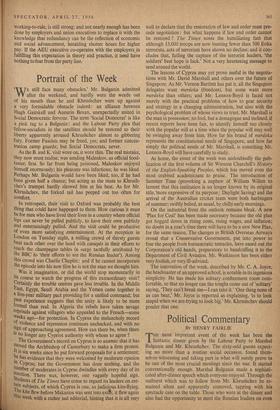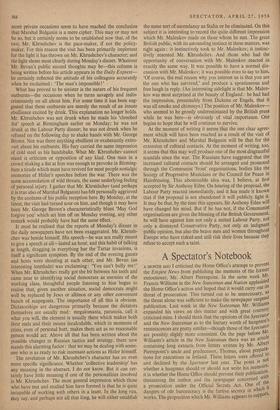Political Commentary
By HENRY FAIRLIE THE most important event of the week has been the fantastic dinner given by the Labour Party to Marshal Bulganin and Mr. Khrushchev. The sixty-odd guests expect- ing no more than a routine social occasion, found them- selves witnessing and taking part in what will surely prove to be one of the most crucial meetings since the war. It started conventionally enough. Marshal Bulganin made a sophisti- cated after-dinner speech which everyone enjoyed. Through the outburst which was to follow from Mr. Khrushchev he re- mained silent and apparently unmoved, tapping with his spectacle case on the table. Those who were at the dinner and also had the opportunity to meet the Russian leaders on even more private occasions seem to have reached the conclusion that Marshal Bulganin is a mere cipher. This may or may not be so, but it certainly seems to be established now that, of the two, Mr. Khrushchev is the pace-maker, if not the policy- maker. For this reason the visit has been primarily impbrtant for the light it has thrown on Mr. Khrushchev's character; and the light shone most clearly during Monday's dinner. Whatever Mr. Bevan's public second thoughts may be—this column is being written before his article appears in the Daily Express— he certainly reflected the attitude of his colleagues accurately when he exclaimed : 'The man's impossible!'
What has proved to be sinister is the nature of his frequent outbursts—the occasions when he turns savagely and indis- criminately on all about him. For some time it has been sug- gested that these outbursts are merely the result of an innate ebullience excited by drink. This explanation no longer holds.
Mr. Khrushchev was not drunk when he made his 'clenched fist' speech at Birmingham earlier on Monday; he was not drunk at the Labour Party dinner; he was not drunk when he refused on the following day to shake hands with Mr. George Brown. Nor was there anything ebullient or exuberantly extro- vert about his outbursts. His fury carried the same impression of cold steel as his handshake. What Mr. Khrushchev'cannot stand is criticism or opposition of any kind. One man in a crowd shaking a fist at him was enough to provoke in Birming- ham a tirade which must have revived for most people nostalgic memories of Hitler's speeches before the war. There was the same accumulation of wild threats, the same underlying feeling of personal injury. I gather that Mr. Khrushchev (and perhaps it is true also of Marshal Bulganin) has felt personally aggrieved by the coolness of his public reception here. By Monday, at the latest, the visit had turned sour on him, and though it may have been Mr. George Brown's characteristically blunt 'May God forgive you' which set him off on Monday evening, any other remark would probably have had the same effect.
It must be realised that the reports of Monday's dinner in the daily newspapers have not been exaggerated. Mr. Khrush- chev was beside himself. His speech—he was not really meant to give a speech at all—lasted an hour, and this habit of talking at length, dragging in everything bar the Tartar invasions, is itself a significant symptom. By the end of the evening guests and hosts were shouting at each other, and Mr. Bevan (an interesting interlude) was exclaiming : 'You can't bully me!'
When Mr. Khrushchev really got the bit between his teeth and came near to identifying social democrats as enemies of the working class, thoughtful people listening to him began to realise that, given another situation, social democrats might well be replaced by Jews or albinos or any other convenient bunch of scapegoats. The importance of all this is obvious.
Dictatorships are dangerous primarily because the dictators themselves are usually mad : megalomania, paranoia, call it what you will, the element is usually there which makes both their ends and their means incalculable, which in moments of crisis, even of personal hurt, makes them act as no reasonable person would act. Above all that has been written about the possible changes in Russian tactics and strategy, there now stands this alarming factor: that we may be dealing with some- one who is as ready to risk insensate.actions as Hitler himself.
The revelation of Mr. Khrushchev's character has an even more specific significance. Whether 'collective leadership' has any meaning in the abstract, 1 do not know. But it can cer- tainly have little meaning if one of the personalities involved is Mr. Khrushchev. The most general impression which those who have met and studied him have formed is that he is quite incapable of working with others in a team. In the long run, they say, and perhaps not all that long, he will either establish the same sort of ascendancy as Stalin or be eliminated. On this subject it is interesting to record the quite different impression which Mr. Malenkov made on those whom he met. The great British public, with its astounding instinct in these matters, was right again : it instinctively took to Mr. Malenkov; it instinc- tively resented. Mr. Khrushchev. And those who had the opportunity of conversation with Mr. Malenkov reacted in exactly the same way. It was possible to have a normal dis- cussion with Mr. Malenkov; it was possible even to say to him, 'Of course, the real reason why you interest us is that you are the one who has survived,' and produce a spontaneous and free laugh in reply. (An interesting sidelight is that Mr. Malen- kov was most surprised at the beauty of England : he had had the impression, presumably from Dickens or Engels, that it was all smoke and chimneys.) The position of Mr..Malenkov- who seemed to be grossly underestimated by the British press while he was here—is obviously of vital importance. One begins to hope that he will continue to survive.
At the moment of writing it seems that the one clear agree- ment which will have been reached as a result of the visit of Mr. Khrushchev and Marshal Bulganin will be that for the extension of cultural contacts. At the moment of writing, too, it seems that this may well produce one of the most disgraceful scandals since the war. The Russians have suggested that the increased cultural contacts should be arranged and promoted through the Communist 'front' organisations, bodies like the Society of Progressive Musicians or the Council for Peace in Hairdressing. This abominable idea was, I believe, at first accepted by Sir Anthony Eden. On hearing of the proposal, the Labour Party reacted immediately, and it has made it known that if the proposal is not abandoned it will publicly fight it. It may be that, by the time this appears, Sir Anthony Eden will have changed his mind. But if he has not, if the Communist organisations are given the blessing of the British Government, he will have against him not only a united Labour Party. not only a dismayed Conservative Party, not only an indignant public opinion, but also the brave men and women throughout Europe who have risked and still risk their lives because they refuse to accept such a taint.











































 Previous page
Previous page